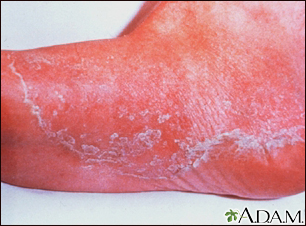Pregnancy SmartSiteTM
Tinea pedis; Fungal infection - feet; Tinea of the foot; Infection - fungal - feet; Ringworm - foot DefinitionAthlete's foot is an infection of the feet caused by fungus. The medical term is tinea pedis or ringworm of the foot. CausesAthlete's foot occurs when a certain fungus grows on the skin of your feet. The same fungus may also grow on other parts of the body. However, the feet are most commonly affected, especially between the toes. Athlete's foot is the most common type of tinea infection. The fungus thrives in warm, moist areas. Your risk for getting athlete's foot increases if you:
Athlete's foot is easily spread. It can be passed through direct contact or contact with items such as shoes, stockings, and shower or pool surfaces. SymptomsThe most common symptom is cracked, flaking, peeling skin between the toes or on the side of the foot. Other symptoms can include:
If the fungus spreads to your nails, they can become discolored, thick, and even crumble. Athlete's foot may occur at the same time as other fungal or yeast skin infections such as jock itch. Exams and TestsYour health care provider can usually diagnose athlete's foot simply by looking at your skin. If tests are needed, they may include:
TreatmentOver-the-counter antifungal powders or creams can help control the infection:
In addition:
If athlete's foot does not get better in 2 to 4 weeks with self-care, or frequently returns, see your provider. Your provider may prescribe:
Outlook (Prognosis)Athlete's foot almost always responds well to self-care, although it may come back. Long-term medicine and preventive measures may be needed. The infection can spread to the toenails. When to Contact a Medical ProfessionalContact your provider right away if:
ReferencesElewski BE, Hughey LC, Hunt KM, Hay RJ. Fungal diseases. In: Bolognia JL, Schaffer JV, Cerroni L, eds. Dermatology. 5th ed. Philadelphia, PA: Elsevier; 2025:chap 77. Hay RJ. Dermatophytosis (ringworm) and other superficial mycoses. In: Bennett JE, Dolin R, Blaser MJ, eds. Mandell, Douglas, and Bennett's Principles and Practice of Infectious Diseases. 9th ed. Philadelphia, PA: Elsevier; 2020:chap 266. | |
| |
Review Date: 4/1/2025 Reviewed By: Elika Hoss, MD, Assistant Professor of Dermatology, Mayo Clinic, Scottsdale, AZ. Also reviewed by David C. Dugdale, MD, Medical Director, Brenda Conaway, Editorial Director, and the A.D.A.M. Editorial team. The information provided herein should not be used during any medical emergency or for the diagnosis or treatment of any medical condition. A licensed medical professional should be consulted for diagnosis and treatment of any and all medical conditions. Links to other sites are provided for information only -- they do not constitute endorsements of those other sites. No warranty of any kind, either expressed or implied, is made as to the accuracy, reliability, timeliness, or correctness of any translations made by a third-party service of the information provided herein into any other language. © 1997- A.D.A.M., a business unit of Ebix, Inc. Any duplication or distribution of the information contained herein is strictly prohibited. | |

 Athlete's foot - t...
Athlete's foot - t...
